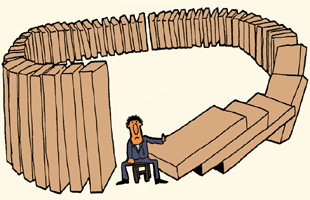This article was written to Buddhist Spectrum of the Daily News on 03 July 2008 by Shamika Soysa.
One of the main teachings of Lord Buddha is the Law of Kamma. However, this is one of the teachings which have been taken incorrectly by many Buddhists. We used to hear many saying "Karume" to explain many of the negative incidents happen to them. This is against the teachings of Lord Buddha and Kamma does not provide explanations or excuses for all the incidents occur in ones life.What is Kamma?
Acts by a human involves a thought process. At every instance there occurs a chitta (consciousness). These chittas occur in two ways;
1. Sahetukas (with roots)
2. Ahetukas (without roots)
There are six roots all together and they are two fold
1. Akusala Hetu
1) Lobha (attachement)
2) Dwesha (hatred)
3) Moha (delusion or ignorance)
1) Lobha (attachement)
2) Dwesha (hatred)
3) Moha (delusion or ignorance)
2. Kusala Hetu
1) Alobha (non-attachment or generosity)
2) Adwesha (non-anger, goodwill or loving-kindness)
3) Amoha (knowledge)
1) Alobha (non-attachment or generosity)
2) Adwesha (non-anger, goodwill or loving-kindness)
3) Amoha (knowledge)
At a particular instance when a chitta occurs caused by one or more of akusala hetu then it become an akusala chitta (Immoral consciousness) and same happens with kusala chittas (moral consciousness). Both kusala and akusala cittas constitute kamma (kusala kamma & akusala kamma). Those types of consciousness that arise as the inevitable results of these kusala and akusala cittas are called Vipaka (resultant) Cittas.
To make it simple, when you perform any act there will be whole lot of chittas occurring. They may be all kusala chittas or all akusal chittas or may be a mix. Depending on that when someone performs a volitional act based on kusala chitta he or she collects kusala kamma and based on akusala chittas, the akusala kammas. Kamma would add up to the Samsara and keep on causing the results (kamma vipaka) until the end of Samsara that is until one attains Nibbana. As long as you collect kamma you will be born for them to result. This is explained clearly in conditioned genesis (patichcha samuppada).
All what a Buddhist should understand is that if you perform any act with a good intention, there will be a good result sooner or later. If you perform any act with a bad or evil intention then there will be bad or evil result sooner or later. None other than your own act would cause results of all Karmic acts. Therefore, the buddhist advice is to engage in good deeds as much as possible not only to attain Nibbana but also to live a peaceful life.
Pancha Niyama Dhamma (Five Cosmic Laws)
Many Buddhists think that everything happens because of Karmas which we have done in the previous birth. This is completely wrong. The law of Kamma is integral to the very dynamics of the universe which is explained as "Pancha Niyama Dhamma" known in English as "Five Cosmic Laws". They are;
1) Uthu Niyama the laws of physical, inorganic matter
2) Bheeja Niyama - the laws of living organisms
3) Kamma Niyama - the laws of kamma or moral deeds and their fruits
4) Dhamma Niyama - the laws of spiritual development
2) Bheeja Niyama - the laws of living organisms
3) Kamma Niyama - the laws of kamma or moral deeds and their fruits
4) Dhamma Niyama - the laws of spiritual development
5) Chiththa Niyama - the laws of consciousness
For an example the reason for Tsunami occurred in December 2004 was because of a geographical phenomenon. Tsunami happens not merely because of Kamma. One cannot blame his own Kamma for being a victim of Tsumani but it is more into the Law of physical, inorganic matter (utuniyama). Similarly other 4 cosmic laws would affect for things happen to us in daily life. Therefore making Kamma responsible for everything to make it an excuse is a narrow act by any Buddhist.
You can change effects of Kamma
There are Beneficent (Sampaththi) and Maleficent (Vipaththi) Forces which counteract or support the kammic law. They are;
1) Birth (Gati)
2) Time and conditions (Kala)
3) Personality and appearance (Upadhi)
4) Effort (Payoga)
2) Time and conditions (Kala)
3) Personality and appearance (Upadhi)
4) Effort (Payoga)
For an example say one gets a birth in a very good family. Because of that persons birth some of the resultants of bad kamma would cease or temporary holds. Such situation is called a Birth Beneficient (Gati Sampaththi). This can happen the other way around also as Gati Vipaththi.
Taking another example, say there is a person with good kamma but born in a poor family so he is unable to get good results because of that family been poor. This is called Gati Vipatthi. However, if he/she has Payoga Sampaththi, in other words Effort then he can succeed in life to enjoy the resultants of good kamma in the previous birth.
Even if somebody is with many of bad kamma in his past, by engaging in lots of good deeds that person would be able to collect many kusala kammas which would minimized the effect of bad kamma. If one is suffering at the moment because of bad kamma in past it is not for him or her to hand it over to "Karume" and do nothing. It's up to that person to do as much as good deeds to collect as much as kusala kamma which may cause akusala kamma to cease or their affects to be minimized. This way we can use (rather than abuse) the Karmic Law of Lord Buddha to succeed in our life and samsara.












1 ඔබේ අදහස:
godaak watinawa
Post a Comment